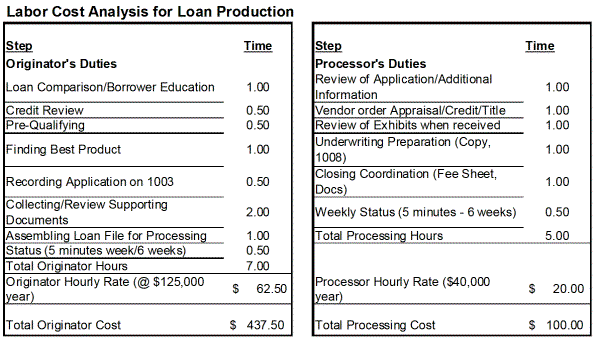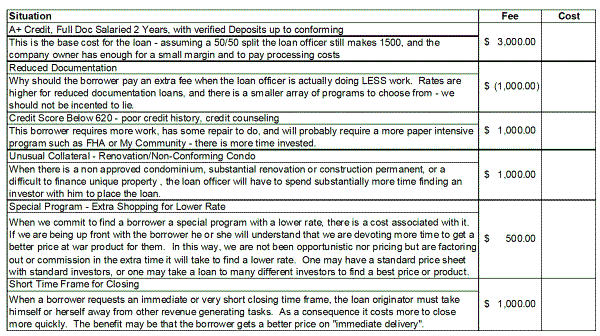|
|
|
|
October 31, 2007 - "News You Can Use" |
|
|
Could This Be The Year Of The Upfront Mortgage Broker?
We have long advocated the total transparency of pricing to new loan originators who will be working in a mortgage broker environment. Loan originators and mortgage companies who are in the business for the long haul understand that relationships which yield referrals are based on trust. In the context of what’s happened in the mortgage markets over the last two years, it seems to make sense that mortgage originators would be going overboard to explain exactly how compensation works and why it makes sense that a loan originator would be worth one, two or even three points.
One seasoned originator scoffed when we suggested pricing based on a fixed cost that reflected what it actually costs to process a mortgage as opposed to an opportunistic pricing model. Most mortgage brokers compensate originators on the basis of total revenue. This is in contrast to mortgage bankers who traditionally compensate originators based on a percentage of the dollar amount of the mortgage volume.
We understand that mortgage bankers have internal pricing models that count on a geographic loan volume and they build that into their pricing. But mortgage brokers have no such incentives. As a consequence, a mortgage broker who charges two points or 2% of the loan amount, on a $1 million mortgage is pricing himself or herself out of the market. Conversely, a broker who charges 2% of the loan amount on a $50,000.00 mortgage is not making enough revenue to support the cost of originating the mortgage.
What does it really cost to originate a mortgage?
The owner of a mortgage broker understands that there are certain physical costs associated with running a business. Rent, utilities, supplies and other hard costs are a component. The biggest component of a service business, however, is labor. In this case, the labor is provided by the loan originator or a loan processor. How much time is involved in processing a mortgage application?
OK. No originator gets into the loan business to make $500.00 for one origination. By the same token, should a loan officer make $5,000.00 on one application simply because the borrower is not sophisticated enough to understand his or her choices? Here we arrive at the debate that is currently being conducted by regulators across the country. What is a “fair” amount of compensation for a loan originator? Should the regulator determine that? That’s not competitive, or in the spirit of commerce in this country. No one would advocate for price regulation.
To avoid the implication of opportunistic pricing, regardless of whether the originator is working with a prime or subprime borrower, the originator should consider a customer pricing strategy based on the value of the service provided. We all know that some loans are more difficult than others. We should be compensated more for the loans that take more time to process. Loans which take less time to process should be priced more competitively.
As a loan originator, one thing that drives me nuts is the borrower who takes a lot of my time with daily calls to check on what has happened on his or her loan in the last fifteen minutes. High maintenance clients keep us from getting new business, so should we charge them more? I used to joke with this type of client and say “I hope you’re enjoying this conversation because it’s costing you $125.00 an hour.” This would normally curtail frequent conversations.
High maintenance clients are unnecessarily time consuming, but there are loans which are challenging to originate, and require more of my time as a loan originator. When the loan officer is working on a challenging transaction he or she could be opportunistic and withhold pricing information until the loan was near closing. At the last minute the borrower has no time to find competing financing and must accept whatever price is offered. It is more honest, up front, and ethical approach to say “This transaction is going to take me about 40 hours to place, so I need to charge more. Here is my price schedule.”
Hypothetical Fee Chart Based on Costs
If you were charging a fee for service, these are the kinds of justifications that make sense. You may note that we haven’t added a fee for “difficult person”, which would be humorous. There are many add-ons that might cause an extra cost – self-employment, investment property, non-citizen borrowers are among justifiable time challenges. We have proposed some basic fee guidelines here, some are realistic and some are intended to be humorous.
Dollar costs are fees, which are generally not tax deductible. When we communicate fees, we should communicate them in writing as a percent of the loan amount. Loan points, whether paid to a mortgage broker or a mortgage banker, are generally tax deductible.
Today’s complaint is that borrowers don’t understand what the price of the loan is and what the mortgage broker or mortgage banker is making. Can a mortgage broker who participates in opportunistic pricing really say that the borrower has been completely informed about the price? The reality is that, either because of incompetence or because of intentional deception, borrowers do not understand their transactions. Whose job is that? It is the loan officer’s job to explain the details of the transaction. If the borrower does not understand, the person who is culpable is the loan officer. If, by some unfortunate chance, legislatures implement pricing regulation it is because of the actions of individuals who do not fully disclose or explain their pricing structure.
By being proactive in the face of this regulation we may be able to preserve the free market as to mortgage financing. Competition benefits everyone because it provides the flexibility to engineer a solution that best meets the borrower’s needs. No regulation can do that.
FHA’s designed a broker contract in 1997. It clearly identifies the role of the broker and how much the broker will charge, where the compensation will come from, and whose interests are being protected. It is a clear, simple form whose use will prevent further legislation and regulation of the mortgage broker business.
http://www.hud.gov/offices/hsg/sfh/res/mbcontr2.cfm HUD Warns Against Non-Approved Loan Correspondents Originating FHA- Insured Loans
We have been warning clients of the danger of non-approved correspondents brokering FHA to some wholesalers. The common wisdom is that the practice is legitimate as long as the wholesaler takes the application. WRONG - According to the alert, “FHA loan origination services must be performed by a FHA-approved lender or FHA-approved mortgage broker (loan correspondent). A loan correspondent may be compensated for the actual loan origination services it performs either directly by the consumer or indirectly by the FHA-approved lender without being in violation of either the RESPA statute and regulations or FHA regulations.”
The notice continued, “In transactions where the mortgage broker is not an FHA-approved broker, the loan origination services cannot be performed. Under these circumstances, RESPA would prohibit the payment to the non FHA-approved mortgage broker because those services, under FHA regulations, would have to be performed again by either an FHA-approved lender or loan correspondent. The payment to the unapproved broker for duplicated services amounts to an unearned fee in violation of section 8(b) of RESPA.”
Further, “this payment also acts as a disguised referral fee for steering the borrower to the FHA-approved lender or loan correspondent which is in violation of section 8(a) of RESPA,” the alert stated. “While a broker who is not FHA-approved may assist a prospective FHA borrower in obtaining an FHA loan, the non-approved broker cannot perform required FHA loan origination services. In these instances, the fee charged must be paid from the mortgagor’s own available assets, must be disclosed on the HUD-1 at closing and a copy of the contract included in the loan file submitted for insurance endorsement.
“Under no circumstances,” the alert continued, “may a borrower pay a fee that is not commensurate with the amount normally charged for the similar services, goods or facilities. If the payment or a portion thereof bears no reasonable relationship to the market value of the goods, facilities or services provided, the excess over the market rate may be used as evidence of a compensated referral or unearned fee in violation of section 8(a) or (b) of RESPA and 24 CFR 3500.14(g).” In other words, a broker might collect several hundred dollars for providing mortgage advice, but there is no way a charge of one or two points is commensurate with that level of service.
The policy alert concluded by saying, “RESPA provided further guidance to industry regarding payments by lenders to mortgage brokers in Policy Statement 1999-1. While the policy statement specifically speaks of lender payments to mortgage brokers, those payments are indirectly paid by the consumer and the policy statement would apply equally to payments made directly by the consumer.”
This is a warning. For those participants who think that this is a casual warning, note that a sanction or disbarment from FHA or other government programs is PERMANENT, and may preclude broker or originator licensing in many states.
The complete alert can be viewed at www.mortgagemanuals.com
Fed Funds Are Not Necessarily Indicative Of Interest Rates
For many years students believe that interest rates were driven by Federal Reserve policy. This was particularly true when applied to home-equity lines of credit which were tied to the “prime rate”. The reality is that the market perceives where interest rates really are, even though it utilizes the Federal credit market as an indication of monetary supply.
A recent Wall Street Journal article (11/06/07) pointed this out. “Under normal conditions, interest rates on savings accounts, money-market funds, certificates of deposit, home-equity loans and other types of loans fall when the central bank slashes the federal-funds rate. Despite a decline of 0.75 percentage points in the federal-funds rate since September, savers continue to benefit from interest rates on savings accounts, money-market funds and certificates of deposit either holding steady or experiencing only modest declines. Rate cuts usually are most favorable for borrowers, yet Bankrate.com reports that borrowing costs on home-equity loans have slipped only to 8.04 percent from 8.08 percent in July; meanwhile, 30-year fixed mortgage rates, which are connected to 10-year Treasury yields, also have not dropped as much as analysts expected. Experts attribute the current scenario to banks refusing to lower interest rates on many types of loans to offset higher costs of raising capital, and they have not reduced rates on savings accounts and other such investments because they hope to increase deposits.”
|
Quality Control Plans - meet FHA Requirements, Investor Approval, State Approval
Maryland Mortgage Continuing Education Credit - Lender Licenses Due 10/31/07
On-Line and Self-paced Training Classes - Combine Sales, Continuing Education and Initiation
Training Books for New Employees
Coaching for Loan Officers and Managers
Learning Management Systems for all employees
|
|
QuickStart Mortgage Training Programs lendertraining.com on-line solutions 1 Research Court, Suite 450 Rockville, MD 20850 301-738-7031 - Office 877-91-TRAIN - Toll Free 877-729-4033 - Fax
|
All Material Copyright 2006 QuickStart Publications visit
|
| © 2007 QuickStart/Lendertraining.com | |



